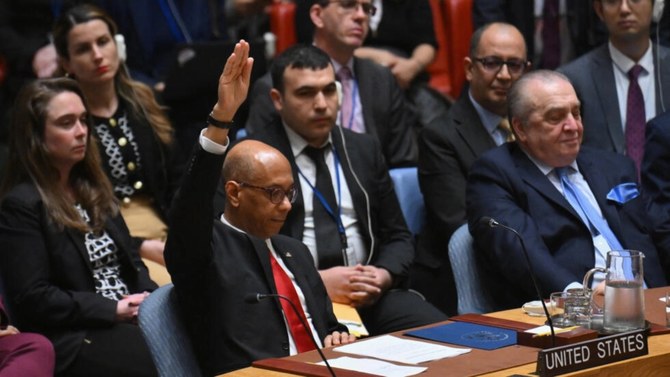
- ARAB NEWS
- 11 Jul 2025

The US last week vetoed a UN Security Council resolution that would have recommended that “the State of Palestine be admitted to membership in the United Nations.” The veto — the only “no” vote on the council — defeated the resolution.
Current US policy supports “Palestinian statehood in the context of a comprehensive peace agreement” negotiated between Israel and the Palestinians. President Joe Biden has emphasized his position that “the only real solution is a two-state solution.”
Years of rhetoric about a two-state solution, combined with the political effects of the Oslo Accords, created the false impression among many people around the world that the Palestinians basically have a state. Many people see maps listing the entirety of the West Bank and the Gaza Strip as “Palestinian Territories.” They hear about the Palestinian Authority and President Mahmoud Abbas. To many casual observers, it can appear that the Palestinians have something approximating a state with their own government.
The reality is that the Palestinians have never had anything close to a sovereign state. The definition of sovereignty varies depending on the context but, in practical terms as it applies to most people’s lives, sovereignty means that a state has a defined territory, a population and a government that develops and implements policies within the territory and engages in relations with other states. Self-governance is a key part of the idea of state sovereignty. Most people would assume that the ability to defend the state’s territory and people from outside actors is another crucial component.
There has never been a defined territory for Palestinian governance that would be remotely recognizable as a state
Kerry Boyd Anderson
There has never been a defined territory for Palestinian governance that would be remotely recognizable as a state. Setting aside the separation of the West Bank and Gaza, for which there once were potential solutions, the PA has never been granted authority over the West Bank. It has never governed any sort of contiguous territory.
A look at a map that shows how the Oslo II Accord divided the West Bank into Areas A, B and C makes that clear; the PA officially has authority over various dots spread around the West Bank, which are divided by areas under Israeli control. A glance at maps that also include the wall that Israel built deep into the West Bank and the expansion of Israeli settlements clearly demonstrates that there is no current territory that the PA could feasibly govern. Additionally, Palestinians have little or no effective recourse when Israel takes Palestinian land to build roads, a separation wall or Israeli settlements.
The PA can make economic and other policies but it has no realistic ability to implement many of them. The reality is that Israel controls the Palestinians’ economy. In the West Bank, Palestinians need Israeli permission to move goods or people through checkpoints (often more than one) or to construct infrastructure or buildings. Crucially, Israel controls the West Bank’s water resources and ensures that Israeli populations have disproportionate access to that water.
Israel even collects taxes from Palestinians for the PA and sometimes withholds the funds, which contributes to the authority’s fiscal challenges. For decades, Israel had significant control over Gaza’s economy and, after Hamas took over in 2007, Israel imposed severe restrictions that choked the economy.
Despite security cooperation with Israel, the PA has had limited control over security in the areas it is supposed to govern and Israeli forces regularly enter Palestinian-governed areas without any type of Palestinian permission. Israeli forces can hold Palestinians in administrative detention indefinitely.
Furthermore, even US leaders who call for a two-state solution seldom imagine a Palestinian state capable of defending itself. For example, Senate Majority Leader Chuck Schumer recently gave a speech arguing that a two-state solution is the “only real and sustainable solution,” with the caveat that a future Palestinian state would be “demilitarized.”
Even US leaders who call for a two-state solution seldom imagine a Palestinian state capable of defending itself
Kerry Boyd Anderson
The PA has many flaws, but even a perfectly competent, democratic and transparent authority would have failed without the basic components of sovereignty. If a two-state solution has any future viability, then its advocates should recognize that the Oslo process, as implemented, failed to make real progress toward a Palestinian state.
Any new peace efforts should start by recognizing several key realities. First, no Palestinian state is possible without contiguous territory and real sovereignty over both the land and the people.
Second, the Palestinians have learned that promises of a state are hollow at best and deceitful at worst, and they will no longer embrace that hope without very clear, practical steps forward — steps that few Israelis today would be willing to take.
Third, economic-focused approaches that fail to understand the link between economics and sovereignty — such as ideas that the Trump administration proposed — will not work.
Fourth, few, if any, Israeli leaders ever accepted the idea of a fully sovereign Palestinian state. In the 1993 Oslo I Accord, Israel recognized the Palestine Liberation Organization as the Palestinians’ representative but did not recognize Palestinian statehood. The Israeli leaders who sincerely wanted real peace envisioned, at most, a demilitarized Palestinian state with limited independence. Indeed, many Israeli leaders promoted the idea of “autonomy” for the Palestinian people with ongoing Israeli control over the land and security. Other leaders, like Prime Minister Benjamin Netanyahu, never honestly supported even that.
Those realities might make a two-state solution seem impossible. But rather than ignoring reality, a better approach would be to adjust policy, which means an entirely new approach to a two-state solution or another resolution to the conflict altogether.